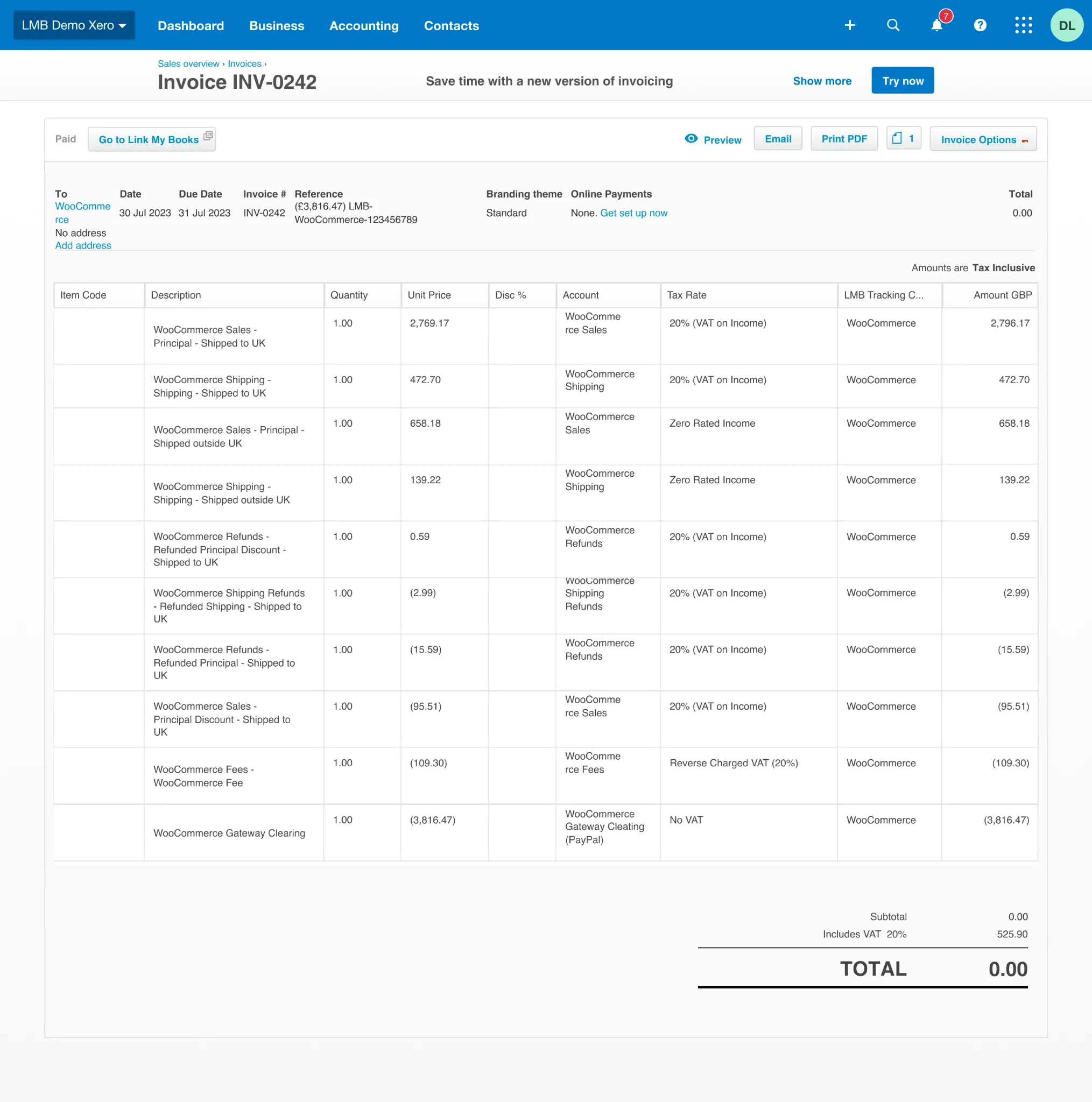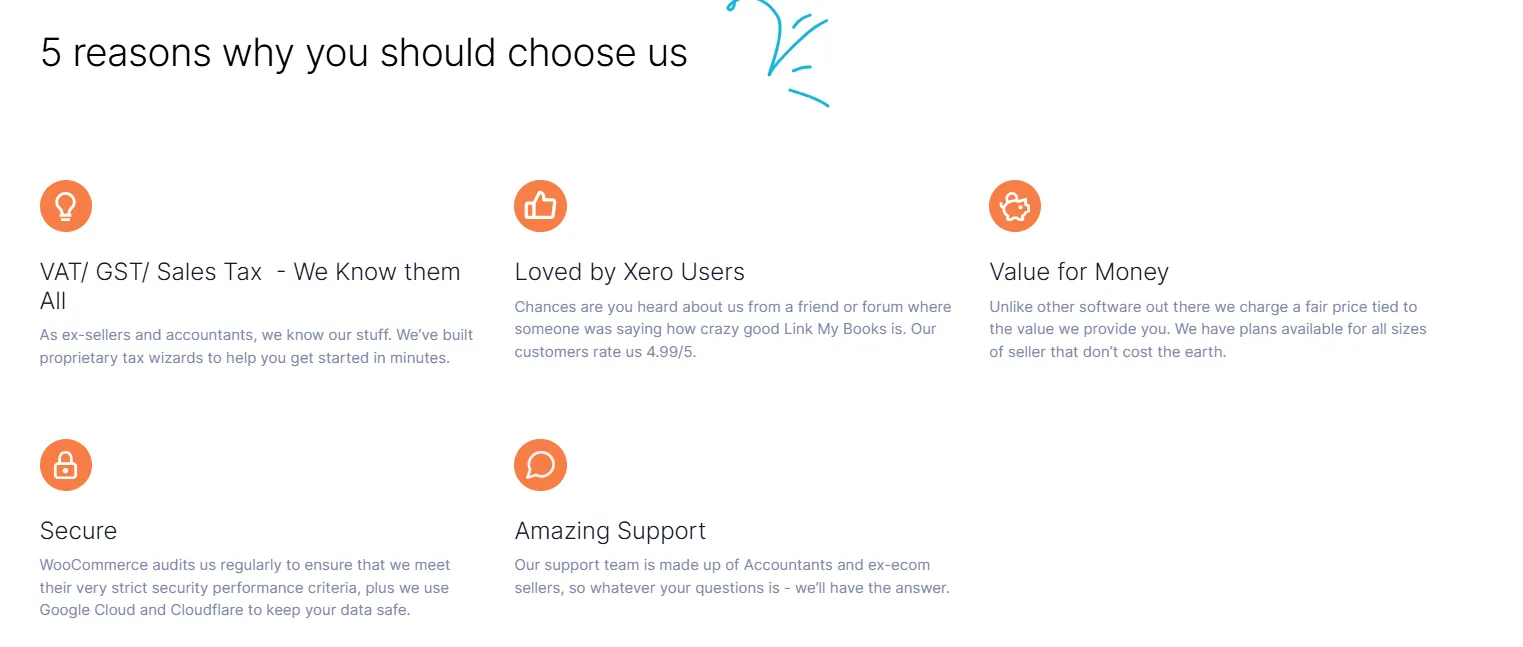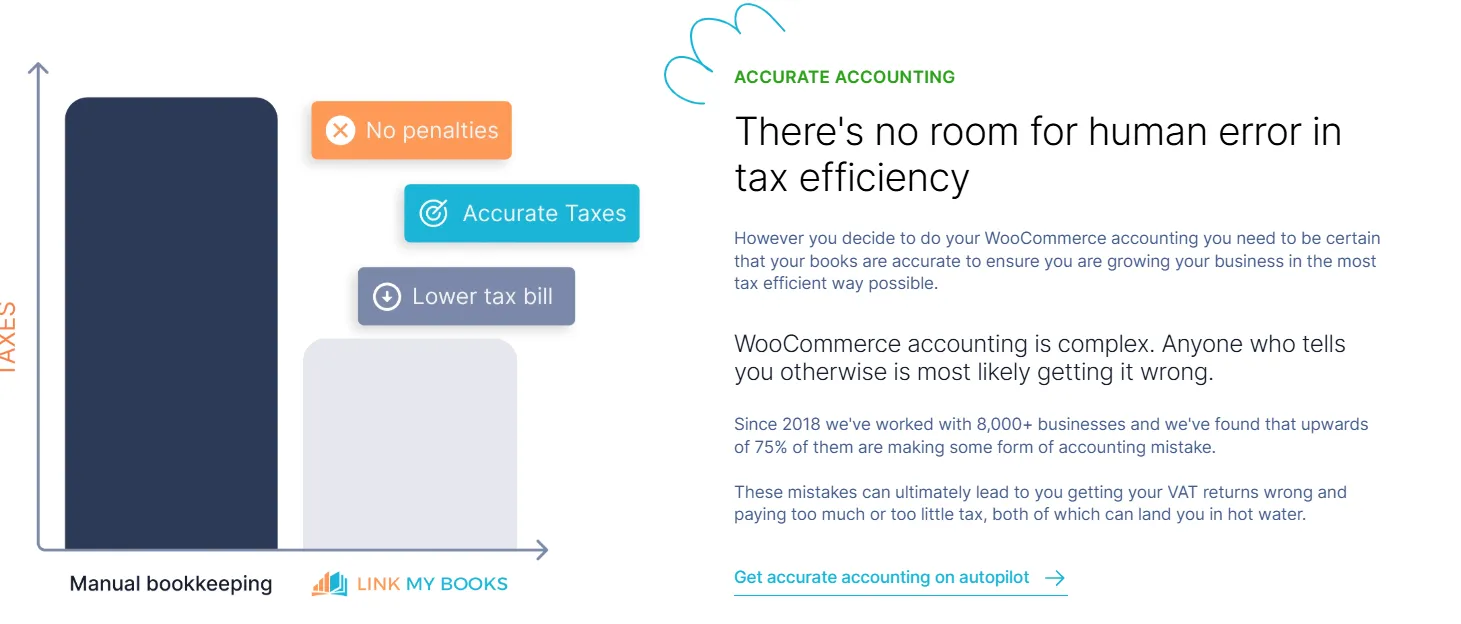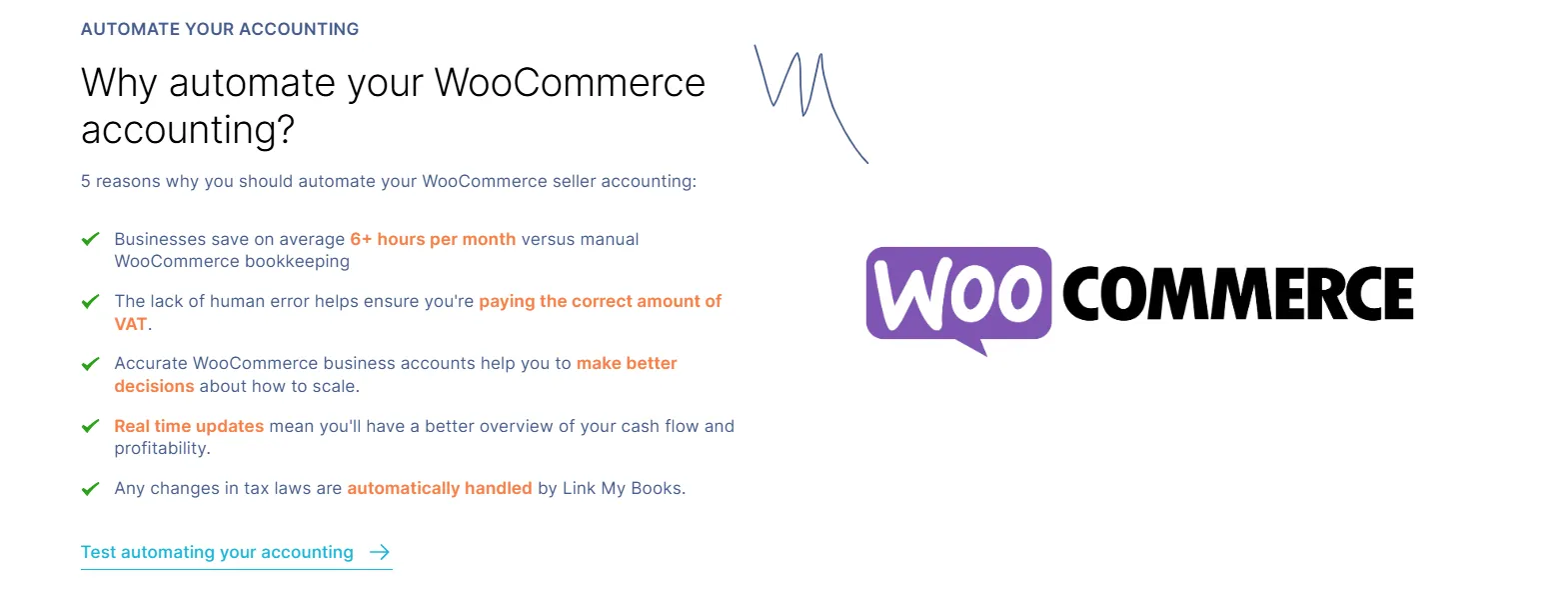Managing the financial side of your WooCommerce store can feel overwhelming. Tracking sales, handling taxes, managing invoices, and ensuring accurate reporting, it’s a lot to juggle. One small mistake can lead to lost revenue, tax issues, or hours of manual corrections.
But it doesn’t have to be this way. The right WooCommerce accounting software can automate tedious tasks, reduce errors, and give you clear insights into your business, so you can make decisions with confidence.
We’ll help you choose the best accounting tools, integrate them seamlessly, with Link My Books and leverage reports to optimize your business.
Key Takeaways from this Post
Choose the Right Software: Simplify WooCommerce finances with tools like QuickBooks and Xero, for seamless tracking and reporting.
Forget Manual Tracking: Spreadsheets are a thing of the past, if you’re serious about running your business smoothly you need to automate.
Seamless Integration: Use tools like Link My Books to connect your accounting software with WooCommerce, ensuring real-time data syncing and automated invoicing.







What Is WooCommerce Accounting?
WooCommerce accounting refers to the process of tracking, managing, and analyzing your store’s financial transactions. It ensures accurate bookkeeping, tax compliance, and financial insights that help you make informed business decisions.
What Does WooCommerce Accounting Involve?
Proper WooCommerce accounting covers more than just sales tracking, it includes various financial aspects essential to running a successful store.
Tracking Revenue and Expenses
- Sales and revenue: Monitor all transactions, including product sales, shipping fees, and discounts, to maintain accurate financial records.
- Operating costs: Keep track of expenses like hosting, plugins, advertising, and inventory purchases to understand profitability.
Managing Invoices and Payments
- Generating invoices: Automate invoice creation and ensure customers receive proper billing for their orders.
- Tracking payment status: Stay on top of pending, completed, and failed transactions to manage cash flow effectively.
Handling Refunds and Chargebacks
- Processing refunds: Adjust financial records accurately when issuing customer refunds.
- Managing chargebacks: Track disputed payments, resolve issues, and ensure proper reconciliation with accounting records.
Reimbursements for Returns
- Adjusting revenue: Reflect refunded amounts in your financial reports to maintain accurate bookkeeping.
- Tracking return trends: Analyze return reasons to improve product quality and customer satisfaction.
Settlements or Disbursements
- Understanding payout schedules: Know when payment processors like PayPal or Stripe deposit funds into your account.
- Reconciling deposits: Ensure received payments match your sales after fees and adjustments.
VAT, GST, Sales Tax, and Other Taxes
- Calculating taxes automatically: Apply the correct tax rates based on customer location and ensure compliance.
- Generating tax reports: Maintain detailed records for VAT, GST, and sales tax to simplify filing.
Collecting and Remitting Sales Tax
- Tracking tax liabilities: Identify how much sales tax you owe in each region where you operate.
- Automating tax filing: Use accounting software that integrates with tax authorities to simplify reporting and payments.
WooCommerce Bookkeeping vs. Accounting
While WooCommerce bookkeeping and WooCommerce accounting are closely related, they serve different purposes in managing your store’s finances. Bookkeeping focuses on recording transactions, while accounting involves analyzing financial data for decision-making and compliance.
Here’s a table comparing them at a glance.
How to Do Bookkeeping for WooCommerce Sellers
Proper bookkeeping is essential for keeping your WooCommerce store’s finances organized, ensuring tax compliance, and making informed business decisions. Manually tracking sales, fees, and expenses can be time-consuming, and Link My Books simplifies the process.
Link My Books is a powerful accounting automation tool that connects WooCommerce with Xero or QuickBooks, ensuring accurate financial records with minimal effort. Instead of manually entering transactions, Link My Books automatically categorizes and syncs your sales, fees, taxes, and payouts.
This is all you need to do:
1. Connect WooCommerce to Xero or QuickBooks

- Link My Books pulls financial data directly from your WooCommerce store.
- The setup process takes just a few minutes and requires no technical expertise.
2. Automatically Categorize Transactions

- Sales, refunds, shipping income, and fees are assigned to the correct accounts in Xero or QuickBooks.
- VAT, GST, and sales tax are accurately separated for compliance.
3. Generate Accurate Summary Invoices

- Instead of cluttering your accounting software with thousands of transactions, Link My Books consolidates sales into daily or weekly summary invoices.
- These summaries match your actual payouts, making reconciliation quick and easy.
4. Reconcile in One Click
- Payouts from payment gateways (like Stripe or PayPal) are automatically matched with invoices in Xero or QuickBooks.
- This eliminates discrepancies and ensures your books are always up to date.
- You can reconcile all your payments in just one click.
Why Do WooCommerce Sellers Choose Link My Books?

Managing your WooCommerce store’s accounting can be time-consuming and complex, but Link My Books simplifies the process by seamlessly integrating with your accounting software. It automates key tasks like sales reconciliation, tax calculations, and financial reporting, ensuring accuracy while saving you hours of manual work.
Here’s why WooCommerce sellers trust Link My Books for their accounting needs.
Automated Accounting

Manually entering sales, fees, and refunds into your accounting software is a hassle and prone to errors. Link My Books automates this process, syncing your WooCommerce transactions directly with Xero or QuickBooks. This eliminates manual data entry, ensuring accurate financial records while freeing up time to focus on growing your business.
Accurate Tax Management

Handling taxes across different regions can be complicated, but Link My Books ensures compliance by applying the correct tax treatment to every transaction. Whether you need to track VAT in the UK, sales tax in the US, or GST in Australia, Link My Books categorizes taxes accurately, reducing the risk of errors and potential penalties.
Cost of Goods Sold (COGS) Tracking

To understand your true profitability per product, you need accurate COGS tracking. Link My Books seamlessly integrates with your accounting software to:
- Track inventory costs in real-time.
- Provide precise profit margin calculations.
- Help optimize pricing and stock management.
With clear insights into how much each product actually costs you, you can make better pricing and purchasing decisions.
Benchmarking for Competitive Insights

How does your WooCommerce store compare to others in your industry? Link My Books’ benchmarking tools provide data-driven insights by anonymously comparing your store’s performance to similar businesses.
- Identify trends in sales and profitability.
- Spot opportunities to optimize pricing and marketing.
- Stay ahead of competitors with strategic decision-making.
By leveraging benchmarking, you can fine-tune your operations and improve long-term business success.
Simplified Bank Reconciliation
Matching WooCommerce payouts to bank deposits manually can be tedious and error-prone. Link My Books streamlines this process by automatically reconciling your payouts with your financial records in Xero or QuickBooks.
Comprehensive Financial Insights

Beyond automating basic accounting, Link My Books provides in-depth financial analytics, helping you:
- Track profitability trends over time.
- Monitor cash flow to prevent shortages.
- Gain real-time insights into your WooCommerce store’s financial health.
With a clear overview of your numbers, you can make smarter business decisions with confidence.
And you can try Link My Books out for free, no credit card needed!
Why WooCommerce Accounting Is Vital for Sellers
Proper accounting is more than just tracking sales, it’s about staying compliant, making informed decisions, and planning for long-term success. Without accurate accounting, WooCommerce sellers risk tax penalties, cash flow issues, and missed growth opportunities. Here’s why accounting should be a priority for every WooCommerce business.
Compliance with Tax Laws
- Avoid penalties and audits: Incorrect tax reporting can lead to fines or legal trouble. Proper accounting ensures you apply the correct VAT, GST, or sales tax rates.
- Simplify tax filings: With accurate records, submitting tax returns becomes faster and easier. Tools like Link My Books automate tax calculations and reporting.
- Stay compliant with international tax regulations: If you sell globally, you need to track cross-border tax rules, including EU VAT and US sales tax.
Understanding Your Business’s Financial Health
- Track revenue and expenses accurately: Knowing where your money comes from and where it goes helps you make better business decisions.
- Monitor profitability: Accounting reports (profit & loss statements, balance sheets) show if your business is growing or losing money.
- Identify trends: Spot seasonal sales patterns, high-performing products, and areas where you may be overspending.
Planning for the Future
- Manage cash flow effectively: Ensure you have enough funds to cover expenses, invest in inventory, and handle unexpected costs.
- Set realistic growth goals: Use financial data to forecast sales, expansion opportunities, and budgeting needs.
- Secure funding or investment: Lenders and investors require accurate financial records before approving business loans or investments.
Preventing Costly Mistakes
- Reduce accounting errors: Misreporting income, expenses, or taxes can cause financial setbacks. Proper accounting minimizes these risks.
- Streamline bookkeeping with automation: Tools like Link My Books help WooCommerce sellers automate transaction tracking, categorize expenses, and reconcile payments, reducing human error.
- Save time and focus on growth: With automated accounting, you can spend less time on spreadsheets and more time scaling your business.
Read more about the 6 Best Accounting Software for WooCommerce.
Do You Need an Accountant for WooCommerce?
While some WooCommerce store owners manage their finances independently, having an accountant ensures accuracy, compliance, and financial stability, especially as your business grows.
That said, even accountants rely on automation tools like Link My Books to streamline bookkeeping and tax preparation. Instead of manually tracking every transaction, accountants and business owners alike use LMB to automate data entry, categorization, and reconciliation.
Whether you’re handling your own finances or working with an accountant, Link My Books is a game-changer. It automates WooCommerce bookkeeping by:
- Categorizing sales, refunds, and fees for accurate financial records.
- Generating tax-ready reports that accountants can use for VAT, GST, or sales tax filings.
- Reconciling payouts from Stripe, PayPal, or other gateways, saves hours of manual work.
If you’re in need of an accountant right now here’s a list of Approved Partner Accountants | E-Commerce Accounting Firms 📊 you can choose from.
👉 Want to see how Link My Books can simplify your WooCommerce accounting? Try it for free today!

Key Financial Reports to Know for WooCommerce Sellers
Understanding your store’s financial performance is crucial for making informed business decisions. The right financial reports help you track revenue, expenses, profitability, and cash flow, giving you a clear picture of your business’s health.
Link My Books simplifies financial reporting by automatically categorizing and syncing your WooCommerce sales data with Xero or QuickBooks, ensuring you always have accurate reports at your fingertips.
Here are the essential reports every WooCommerce seller should know.
Profit & Loss Statement (P&L)

Also known as the income statement, the P&L report shows your store’s revenues, costs, and expenses over a specific period.
Why It Matters:
- Helps you determine profitability by comparing revenue against expenses.
- Identifies high and low-performing products based on their contribution to overall profit.
- Shows trends in revenue and expenses to help you manage costs and pricing strategies.
Link My Books can track P&L by channel and automatically categorize sales, fees, refunds, and expenses, for each of them ensuring that your P&L in Xero or QuickBooks is accurate and tax-ready.

Balance Sheet
A balance sheet provides a snapshot of your business’s financial position at a specific point in time by listing assets, liabilities, and equity.
Why It Matters:
- Helps you understand what your business owns (assets) and owes (liabilities).
- Shows your store’s net worth and whether you have a strong financial foundation.
- Essential for securing loans or investments, as banks and investors rely on it.
Link My Books records your WooCommerce transactions, and keeps your balance sheet updated and precise in your accounting software.
Cash Flow Statement
This report tracks the movement of cash in and out of your business, helping you manage liquidity and avoid cash shortages.
Why It Matters:
- Helps you predict future cash flow to ensure you have enough funds to cover expenses.
- Identifies delayed payouts from payment processors like PayPal or Stripe.
- Allows better planning for inventory purchases, marketing spend, and business investments.
By summarizing and syncing your WooCommerce payouts, fees, and refunds, Link My Books ensures your cash flow statement accurately reflects your real-time cash position.

Sales Tax Summary Report
If you sell in multiple regions, managing VAT, GST, and sales tax can be challenging. This report breaks down:
- How much sales tax you’ve collected per jurisdiction.
- What you owe to tax authorities.
- Any discrepancies in tax reporting.
Link My Books automatically calculates and categorizes tax amounts, ensuring compliance and making tax filing simple.
Accounts Payable & Accounts Receivable Reports
These reports track:
- Accounts payable: What you owe to suppliers, vendors, and service providers.
- Accounts receivable: Outstanding payments customers owe you.
Keeping track of these reports ensures timely payments and a healthy cash flow.
Link My Books t automates invoice tracking in Xero or QuickBooks, helping you manage payables and receivables efficiently.
Key Financial Metrics to Know for WooCommerce Sellers
Tracking essential financial metrics helps WooCommerce sellers optimize pricing, manage costs, and maximize profitability. Instead of manually calculating these figures, Link My Books automates financial tracking and reporting within Xero and QuickBooks, ensuring accurate and up-to-date insights.
Among its powerful features, Link My Books offers automated COGS tracking, financial analytics, and benchmarking, making it easier for sellers to understand their store’s performance at a glance.
Cost of Goods Sold (COGS)
COGS represents the direct costs associated with selling your products, including manufacturing, wholesale purchase costs, and shipping from suppliers.
Why It Matters:
- Helps determine true profitability by showing how much it costs to fulfill an order.
- Ensures accurate tax reporting, as COGS reduces taxable income.
- Provides insight into pricing and profit margin adjustments.
How Link My Books Helps:

- Automated COGS calculations: Syncs cost data with WooCommerce, ensuring accuracy in Xero or QuickBooks.
- Dynamic cost tracking: Reflects real-time changes in supplier pricing or product costs.
- Effortless tax compliance: Ensures COGS deductions are correctly recorded for tax filings.
Gross Margin
Gross margin is the percentage of revenue left after subtracting COGS. It’s calculated as:
Gross Margin (%) = (Revenue - COGS) ÷ Revenue × 100
Why It Matters:
- Indicates how much profit you retain per sale before operating expenses.
- Helps determine if your pricing strategy is sustainable.
- Guides decisions on discounts, promotions, and cost-cutting strategies.
How Link My Books Helps:
- Real-time margin tracking: Automatically updates gross margin figures in Xero or QuickBooks.
- Accurate revenue-cost matching: Ensures each sale is properly accounted for with the associated cost.
Inventory Turnover
Inventory turnover measures how quickly you sell and replace stock. It’s calculated as:
Inventory Turnover = COGS ÷ Average Inventory Value
Why It Matters:
- A high turnover indicates strong sales and efficient inventory management.
- A low turnover suggests overstocking or slow-moving products.
- Helps prevent dead stock that ties up cash and warehouse space.
How Link My Books Helps:
- Automated COGS sync ensures accurate inventory valuation.
- Sales data integration provides insights into fast- and slow-moving products.
Financial Analytics & Benchmarking (Exclusive to Link My Books)

Understanding key financial metrics is important, but benchmarking allows sellers to compare performance against industry standards and competitors.
Why It Matters:
- Tracks profitability trends over time.
- Identifies opportunities for cost savings.
- Helps sellers compare their business performance against others in their industry.
How Link My Books Helps:

- Detailed financial analytics dashboards: Gain insights into revenue, costs, and profits with intuitive reports.
- Benchmarking tools: Compare store performance with similar businesses to identify areas for improvement.
- Automated reporting: No manual calculations, just plug in WooCommerce, and Link My Books does the rest.
Net Profit Margin
The percentage of revenue that remains as profit after all expenses, including taxes and operating costs.
Net Profit Margin (%) = (Net Profit ÷ Revenue) × 100
Why It Matters:
- Shows overall business efficiency and profitability.
- Helps evaluate if your store is growing sustainably.
- Guides investment and expansion decisions.
How Link My Books Helps:
- Automates net profit tracking with accurate COGS and expense data.
Average Order Value (AOV)
The average amount spent per order. It’s calculated as:
AOV = Total Revenue ÷ Number of Orders
Why It Matters:
- Helps measure customer spending habits.
- Higher AOV means more revenue with fewer transactions.
- Useful for optimizing pricing, upsells, and marketing strategies.
How Link My Books Helps:
- Syncs WooCommerce sales data for seamless AOV tracking.
FAQ

What’s the Best Way to Track Inventory for WooCommerce?
The best way to track inventory depends on your store’s size and complexity.
- WooCommerce’s built-in inventory management: Suitable for small stores, allowing you to set stock levels, track sales, and receive low-stock alerts.
- Dedicated inventory management plugins: Tools like TradeGecko (QuickBooks Commerce), Katana, or Zoho Inventory offer more advanced tracking, including multi-warehouse management and automated stock replenishment.
- Accounting integrations like Link My Books: Helps track COGS and inventory costs, ensuring real-time financial reporting in Xero or QuickBooks.
What External Records of WooCommerce Should You Keep?
Beyond WooCommerce’s internal records, sellers should maintain:
- Invoices and receipts: For customer purchases, refunds, and supplier payments.
- Bank and payment processor statements: To match against WooCommerce payouts from PayPal, Stripe, or bank transfers.
- Tax records: Sales tax filings, VAT/GST reports, and other compliance documents.
- Expense records: Hosting fees, plugin subscriptions, advertising costs, and supplier invoices.
- Accounting reports: Profit & Loss statements, balance sheets, and cash flow summaries.
Store digital copies of these records for at least 3-5 years for tax and audit purposes.
How Much Should You Expect to Pay Per Month to Sort Your WooCommerce Accounting?
The cost of WooCommerce accounting depends on whether you manage it yourself, use automation tools, or hire an accountant.
Combining Link My Books with Xero or QuickBooks gives you cost-effective automation, reducing manual work while keeping expenses low.
[insert pricing short code]
Does WooCommerce Report Income to the IRS?
No, WooCommerce itself does not report income to the IRS, as it is simply an eCommerce platform.
However, your payment processors (PayPal, Stripe, Square, etc.) may report income if you meet IRS thresholds:
- $20,000+ in sales AND 200+ transactions (Form 1099-K).
- Some states have lower thresholds, such as $600 in sales.
Keep detailed income records from WooCommerce, payment gateways, and accounting software to ensure accurate tax filings.
What Is the Best Way to Handle Returns and Refunds in WooCommerce Accounting?
Proper accounting for refunds ensures accurate financial records and tax compliance.
- Record refunds correctly: Deduct refunded sales from revenue to prevent overstating income.
- Adjust COGS where needed: If returned items are resellable, adjust inventory levels accordingly.
- Track refund reasons: Identifying patterns can help reduce future returns.
- Use accounting automation: Link My Books automatically categorizes refunds in Xero or QuickBooks, ensuring correct financial statements.
Reconcile refunds weekly to avoid discrepancies in sales reports.
How Often Should I Reconcile My WooCommerce Financial Records?
Regular reconciliation ensures your books match your actual financial activity.
- Daily: Check new transactions and WooCommerce sales.
- Weekly: Reconcile payment gateway payouts (PayPal, Stripe, etc.).
- Monthly: Match WooCommerce financial reports with Xero or QuickBooks to ensure accuracy.
- Quarterly: Review tax reports and prepare for filings.
How Do I Categorize My WooCommerce Sales and Expenses for Bookkeeping?
Proper categorization ensures accurate financial reporting.
- Sales categories: Revenue from product sales, shipping fees, discounts.
- Cost of Goods Sold (COGS): Supplier costs, manufacturing, shipping from suppliers.
- Operating expenses: Marketing, software subscriptions, web hosting, salaries.
- Transaction fees: PayPal, Stripe, or bank processing fees.
- Taxes: VAT, GST, or sales tax collected and remitted.
Use Link My Books to automate expense categorization in Xero or QuickBooks, reducing manual bookkeeping errors.
Make WooCommerce Accounting Easy and Accurate With Link My Books

WooCommerce accounting isn’t just about staying organized, it’s essential for compliance, financial clarity, and business growth. Whether you’re managing it yourself or working with an accountant, using the right tools can make a huge difference.
👉 Want to simplify your WooCommerce accounting? Try Link My Books for automated bookkeeping and effortless tax compliance.



![WooCommerce Accounting 101 [Guide for 2025]](https://cdn.prod.website-files.com/60af32ce0a63dc4f22cc85a1/6638a0c28e352e7519e44b88_WooCommerce%20Accounting%20101%20-%20Software%2C%20Reports%2C%20and%20More.webp)










.webp)




.png)